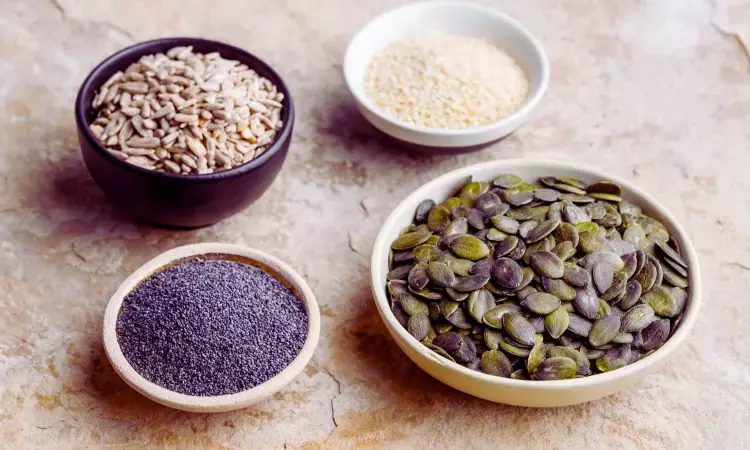- Home
- Medical news & Guidelines
- Anesthesiology
- Cardiology and CTVS
- Critical Care
- Dentistry
- Dermatology
- Diabetes and Endocrinology
- ENT
- Gastroenterology
- Medicine
- Nephrology
- Neurology
- Obstretics-Gynaecology
- Oncology
- Ophthalmology
- Orthopaedics
- Pediatrics-Neonatology
- Psychiatry
- Pulmonology
- Radiology
- Surgery
- Urology
- Laboratory Medicine
- Diet
- Nursing
- Paramedical
- Physiotherapy
- Health news
- Fact Check
- Bone Health Fact Check
- Brain Health Fact Check
- Cancer Related Fact Check
- Child Care Fact Check
- Dental and oral health fact check
- Diabetes and metabolic health fact check
- Diet and Nutrition Fact Check
- Eye and ENT Care Fact Check
- Fitness fact check
- Gut health fact check
- Heart health fact check
- Kidney health fact check
- Medical education fact check
- Men's health fact check
- Respiratory fact check
- Skin and hair care fact check
- Vaccine and Immunization fact check
- Women's health fact check
- AYUSH
- State News
- Andaman and Nicobar Islands
- Andhra Pradesh
- Arunachal Pradesh
- Assam
- Bihar
- Chandigarh
- Chattisgarh
- Dadra and Nagar Haveli
- Daman and Diu
- Delhi
- Goa
- Gujarat
- Haryana
- Himachal Pradesh
- Jammu & Kashmir
- Jharkhand
- Karnataka
- Kerala
- Ladakh
- Lakshadweep
- Madhya Pradesh
- Maharashtra
- Manipur
- Meghalaya
- Mizoram
- Nagaland
- Odisha
- Puducherry
- Punjab
- Rajasthan
- Sikkim
- Tamil Nadu
- Telangana
- Tripura
- Uttar Pradesh
- Uttrakhand
- West Bengal
- Medical Education
- Industry
Most Kids Tolerate Sesame and Sunflower Seeds Despite Suspected Allergy: New Data Reveal

USA: A new retrospective study published in The Journal of Allergy and Clinical Immunology: In Practice provides important insights into the evaluation and outcomes of seed allergies in children.
Conducted by Dr. Timothy M. Buckey and colleagues from the Division of Allergy and Immunology at the Children’s Hospital of Philadelphia (CHOP), the study reviewed nearly two decades of oral food challenge (OFC) data to better understand clinical reactivity to a range of seeds beyond sesame—an allergen now recognized as a major contributor to food allergy–related reactions.
The analysis included 392 oral food challenges in 361 children, most of whom were boys and predominantly White. These challenges, performed between 2005 and 2024, covered eight seeds commonly associated with allergic responses: sesame, sunflower, mustard, flaxseed, poppy, caraway, chia, and annatto. Each OFC followed a stepwise, unblinded approach, with doses given every 20 minutes to reach an age-appropriate cumulative protein intake. Several children underwent testing for more than one seed, and a few required repeated challenges for the same seed.
The study led to the following findings:
- Sesame was the most commonly tested seed, with nearly 300 challenges conducted.
- Around 72% of children successfully tolerated sesame reintroduction, suggesting many may outgrow sesame allergy or may have been misidentified as allergic.
- Children who reacted to sesame had larger SPT wheal sizes (5 mm vs 4 mm) and higher sesame-specific IgE levels than those who tolerated it.
- Sunflower challenges showed an 87.5% tolerance rate, the highest among all tested seeds.
- Mustard challenges demonstrated an 82.1% tolerance rate.
- Sunflower-allergic children had significantly larger SPT wheal sizes (8 mm vs 4 mm), indicating stronger sensitization.
- Correlations between SPT/sIgE levels and clinical reactivity were strongest for sesame and sunflower, supporting their usefulness in predicting challenge outcomes.
- Most reactions during oral food challenges were mild to moderate and manageable.
- H1 antihistamines were given to 81 children, and 61 required epinephrine during reactions.
- Two children had severe reactions to sesame, each requiring three doses of epinephrine and hospitalization.
According to the authors, the study’s findings indicate that elevated SPT wheal sizes and higher sIgE levels may serve as useful predictors of clinical reactivity to sesame and sunflower. “Sunflower and sesame SPTs correlated with OFC outcomes and may be reliable indicators of clinical reactivity,” the researchers noted, emphasizing their potential role in refining allergy evaluation strategies.
"However, the study’s retrospective design and the exclusion of individuals who never underwent food challenges limit its ability to estimate true seed allergy prevalence in the general pediatric population. Despite these constraints, the work contributes valuable evidence toward understanding how children respond to seed allergens and the diagnostic tools that may help guide safe dietary decisions," they concluded.
Reference:
Buckey TM, Navard-Keck A, Atalla J, Samandi L, Ram G, Spergel JM, Kennedy KL. Seed Allergy Evaluation and Outcomes in a Pediatric Food Challenge Center. J Allergy Clin Immunol Pract. 2025 Oct 22:S2213-2198(25)00960-2. doi: 10.1016/j.jaip.2025.10.009. Epub ahead of print. PMID: 41135849.
The Journal of Allergy and Clinical Immunology: In Practicefood allergyOral Food ChallengesAllergen-Specific IgE
Source : The Journal of Allergy and Clinical Immunology: In PracticeDr Kamal Kant Kohli-MBBS, DTCD- a chest specialist with more than 30 years of practice and a flair for writing clinical articles, Dr Kamal Kant Kohli joined Medical Dialogues as a Chief Editor of Medical News. Besides writing articles, as an editor, he proofreads and verifies all the medical content published on Medical Dialogues including those coming from journals, studies,medical conferences,guidelines etc. Email: drkohli@medicaldialogues.in. Contact no. 011-43720751
Next Story


